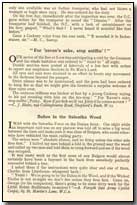Memoirs & Diaries - The Best 500 Cockney War Stories - "For 'Eavens Sake, Stop Sniffin'!" and Other Stories
 Published in London
in 1921, The Best 500 Cockney War Stories
comprised, in the words of its newspaper publisher (The London Evening
News) "a remembering and retelling of those war days when laughter
sometimes saved men's reason".
Published in London
in 1921, The Best 500 Cockney War Stories
comprised, in the words of its newspaper publisher (The London Evening
News) "a remembering and retelling of those war days when laughter
sometimes saved men's reason".
The collection of short memoirs, some 500 in total, is divided into five categories - Action, Lull, Hospital, High Seas and Here and There. This page contains five stories from Lull, led by "For 'Eavens Sake, Stop Sniffin'!"
Other sections within the collection can be accessed using the sidebar to the right.
"For 'Eavens Sake, Stop Sniffin'!"
Our sector of the line at Loos was anticipating a raid by the Germans and the whole battalion was ordered to "stand to" all night. Double sentries were posted at intervals of a few feet with orders to report any suspicious shadows in No Man's Land.
All eyes and ears were strained in an effort to locate any movement in the darkness beyond the parapet..
Strict silence was to be maintained, and the guns had been ordered to hang fire so that we might give the Germans a surprise welcome if they came over.
The ominous stillness was broken at last by a young Cockney saying to his pal standing with him on the fire-step: "For 'Eaven's sake, stop sniffin', Porky. How d'yer fink we'll 'ear Jerry if he comes acrorst?"
C. J. Blake, 29a Collingbourne Road, Shepherd's Bush, W.12
Babes in the Salonika Wood
I was with the Salonika Force on the Dorian front.
One night while an important raid was on my platoon was told off to seize a big wood between the lines and make sure it was clear of Bulgars, who could otherwise have enfiladed the main raiding party.
The orders were "absolute silence, and no firing unless the other side fires first."
I halted my men behind a fold in the ground near the wood and called up two men and told them to creep forward and see if the wood was occupied.
It was nasty work as the first news of any Bulgars would almost certainly have been a bayonet in the back from somebody perfectly concealed behind a tree.
I asked them if the instructions were quite clear and one of them, Charlie, from Limehouse, whispered back:
"Yessir! We're going to be the Babes in the Wood, and if the Wicked Uncles is out tonight we don't fire unless they fires first. Come on, George (to his companion), there's going to be some dirty work for the Little Robin Redbreasts tomorrer!"
A. Forsyth (late Army Cyclist Corps), 65 St. Martin's Lane, W.C.2
Bringing it Home to Him
For several months in 1917 matches were rationed in a Y.M.C.A. rest-camp canteen, somewhere in France.
There entered during this time a war-worn Cockney, a drawn, tired look still in his eyes, and the mud of the trenches on his uniform and boots. He asked for cigarettes and matches, and was told there were no matches.
"Wot, no matches? 'Ow am I goin' ter light me fags, miss?"
"You see matches are rationed now," I said, "and the few we are allowed run out at once."
With a weary sigh, as if a great truth had dawned upon him, he said pathetically:
"Lumme, that do bring the war 'ome to a bloke, don't it, miss?"
Miss H. Campbell, Pennerly Lodge, Beaulieu, Hants
After the Feast
The company dinner on Christmas Day 1917 was eaten in a large barn at Ribemont, on the Somme, and before this extra special feast began an affable "old sweat," one Billy Williams, of London Town, volunteered for the clearing-up party.
It was a long sitting and some considerable time before the men began to wander back to their billets, and it fell to the most capable of the orderlies to clear up the debris.
This had just been accomplished to the satisfaction of the orderly officer when out of the barn strode old Billy carrying a dixie full of beer.
"Where are you going with that, Williams?" asked the officer.
Springing smartly to attention, and with a pained look upon his face, old Billy replied: "This 'ere, sir? Sick man in the 'ut, sir!"
R. E. Shirley (late The London Regiment), 5 Staunton Road, Kingston, Surrey
Wait for the "Two Pennies, Please"
Near the River Struma, on the Salonika front, in March 1917 our brigade H.Q. was on the extreme right of the divisional artillery and near a French artillery brigade.
For the purpose of maintaining communication a French telephonist was quartered in our dug-out. Whenever he wished to get into communication with his headquarters he unmercifully thumped the field telephone and in an excitable voice called out: "'Ullo, mon capitaine," five or six times in half as many seconds.
Greatly impressed by one of these sudden outbursts, the adjutant's batman - a typical Cockney - exclaimed in a hurt voice: "Nah then, matey, jest cool yerself a bit till the young lidy tells yer to put in yer two coppers!"
F. G. Pickwick (301 Brigade R.F.A.), 100 Hubert Grove, Stockwell, S.W.9
Next - The General Goes Skating and four other stories
"Toc Emmas" was slang for trench mortars.
- Did you know?
